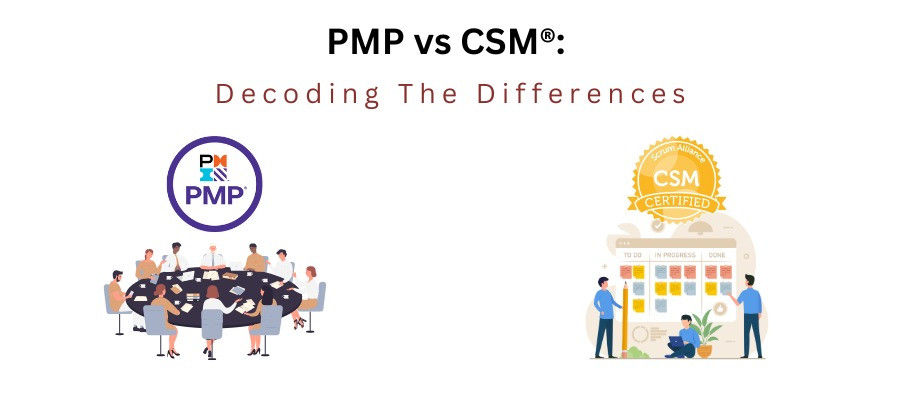PMP vs CSM®: Decoding The Differences

Do you want to shine bright as an Agile Practitioner? PMP (Project Management Professional) and CSM® (Certified Scrum Master) - these two certifications stand out as key players in the ever-evolving landscape of project management. You can receive high-paying job opportunities in reputed MNCs with any of these industry-recognized certifications. So if you want to become a successful Project Manager, it’s essential to understand the differences between PMP and CSM® Certification. This article is here to help you determine which certification aligns better with your career goals and aspirations. So let’s get started!
Overview of PMP Certification:
PMP Certification from the Project Management Institute (PMI) is ideal for future Project Managers. It equips professionals with a complete understanding of various project management processes and best practices. Agile Professionals who want to advance in their careers can achieve the certification and enjoy the following benefits:
- Get industry recognition with this widely accepted certification.
- Acquire crucial project management skills.
- Receive higher pay-cheques from reputed MNCs.
- Demonstrate your commitment as an Agile Leader and a Project Manager.
Overview of CSM® Certification:
Certified Scrum Master or CSM® Certification from Scrum Alliance emphasizes the Scrum methodology as the main Agile project management principle. It is an entry-level professional certification for Scrum Masters who want to grasp the fundamentals of the Scrum framework and the associated project management approaches. The accreditation offers the following benefits to the acquiring professional:
- Upgrade the professional’s mindset inclined toward Agile Training and Learning.
- Equip with new techniques to handle Scrum Teams in an Agile environment.
- Propel and grow career positions with better opportunities and paychecks.
- Improve collaboration among Product Owner, Project Manager, and Developers.
PMP vs CSM®: Key Differences
To shed light on the distinctions between PMP and CSM®, let's explore their unique characteristics and examine how they contribute to project management success. Here are the primary differences between PMP and CSM Certification:
| PMP Certification | CSM® Certification | |
| Focus | Traditional | Agile, Scrum |
| Method | Waterfall | Iterative, Incremental |
| Roles | Project Manager | Scrum Master |
| Documentation | Extensive | Simplified, Face-to-face |
| Exam | 200-question MCQ | Two-day training + Online |
Now, let’s discuss these critical differences in brief.
Exam Prerequisites:
Both PMP and CSM certifications require expertise in project management and supervision. For PMP Certification, you must have at least 36 months of project management experience with a four-year bachelor’s degree. For CSM Certification, there is no specific prerequisite.
Eligibility criteria for the PMP exam:
- 7,500 hours of project management experience
- A secondary education degree
- Project management Training for 35 hours
- Four-year bachelor's degree/diploma
Eligibility criteria for the CSM exam:
- Basic knowledge of the concepts of Scrum Methodology
- Hands-on experience with the Scrum Process
- Brief understanding of the roles of the Product Owner and Scrum Master
Scope and Focus:
PMP encompasses many project management knowledge areas, such as scope, time, cost, quality, risk, and procurement management. It caters to professionals working in diverse industries and projects of varying sizes and complexity. CSM®, on the other hand, concentrates on the Scrum framework, enabling professionals to manage projects efficiently using agile principles. It is ideal for those involved in software development and other iterative projects.
Exam Format:
PMP certification requires passing a 200-question, multiple-choice exam that covers a broad range of project management topics. It tests candidates' knowledge, application, and analytical skills. CSM® certification, on the other hand, involves attending a two-day training session facilitated by a Certified Scrum Trainer. Upon completion, participants take an online exam to validate their understanding of Scrum principles and practices.
Certification Pricing:
The pricing of PMP and CSM certifications vary0 depending on the country you reside in. If you are from the USA, PMP Certification can cost around 1290 to 1800 USD, and CSM Certification can cost about 1000 to 1450 GBP.
Methodologies:
PMP follows a waterfall approach, which involves sequential phases and a linear progression of tasks. It emphasizes detailed planning, risk management, and meeting predetermined objectives. CSM®, on the other hand, adopts an iterative and incremental approach. It encourages adaptability, collaboration, and continuous improvement through shorter development cycles known as sprints.
Roles and Responsibilities:
PMP-certified professionals typically assume the role of a project manager, overseeing the project's entire lifecycle, from initiation to closure. They ensure project goals are met, stakeholders are engaged, and resources are managed effectively. CSM® holders, on the other hand, often work as Scrum Masters. They act as facilitators, coaches, and servant leaders, enabling the Scrum team to self-organize, collaborate, and deliver high-quality results.
Documentation:
PMP places significant emphasis on documentation, requiring project managers to create detailed project plans, charters, schedules, and reports. This documentation aids in communication, risk assessment, and project control. In contrast, CSM® promotes simplicity and prioritizes face-to-face communication, reducing excessive documentation and fostering direct collaboration among team members.
Summing Up:
The choice between PMP and CSM® depends on your professional goals. Now you know the primary difference between these two certifications, consider each certification's unique characteristics to determine which certification you should try for. If you aim to pursue a career in traditional project management, PMP is an excellent choice. On the other hand, if you prefer an agile project management approach, CSM® can be the right fit.
Ultimately, both certifications offer valuable knowledge and skills that can enhance your project management capabilities. To make an informed decision, assess your career aspirations and the industry requirements you wish to work in. Remember, your certification choice can significantly impact your career trajectory by opening doors to exciting opportunities!
Reference:
- https://www.indeed.com/career-advice/career-development/pmp-csm
- https://www.linkedin.com/pulse/pmp-vs-csm-which-one-should-i-get-first-carlos-correia/



